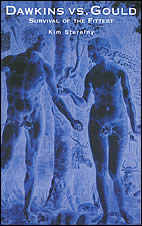Dawkins vs. Gould. Survival of the fittest de Kim Sterelny
 En el terreno de la evolución posiblemente la batalla entre Dawkins y Gould sea la más sonada (al menos, para los que contemplanos ese mundo desde fuera). Una disputa que implica a muchos científicos, en ocasiones a ramas enteras de la biología, y que trasciende el hecho puramente científico para sustentarse sobre cuestiones políticas, sociales y religiosas. En Dawkins vs. Gould, Kim Sterelny intenta aclararnos no tanto quién tiene razón (porque probablemente cada uno tenga su parte de aciertos y fallos) como qué está en juego, en qué suposiciones se apoyan los contendientes y qué diferencias manifiesta cada uno sobre qué es la ciencia. He leído el primer capítulo y parece muy interesante:
En el terreno de la evolución posiblemente la batalla entre Dawkins y Gould sea la más sonada (al menos, para los que contemplanos ese mundo desde fuera). Una disputa que implica a muchos científicos, en ocasiones a ramas enteras de la biología, y que trasciende el hecho puramente científico para sustentarse sobre cuestiones políticas, sociales y religiosas. En Dawkins vs. Gould, Kim Sterelny intenta aclararnos no tanto quién tiene razón (porque probablemente cada uno tenga su parte de aciertos y fallos) como qué está en juego, en qué suposiciones se apoyan los contendientes y qué diferencias manifiesta cada uno sobre qué es la ciencia. He leído el primer capítulo y parece muy interesante:
Science has seen its fair share of punch-ups over the years, but one debate, in the field of biology, has become notorious for its intensity. Over the last twenty years, Richard Dawkins and Stephen Jay Gould have engaged in a savage battle over evolution that shows no sign of waning.
Dawkins, author of The Selfish Gene and The Blind Watchmaker, conceives of evolution as a struggle between gene lineages; Gould, who wrote Wonderful Life and Rocks of Ages, sees it as a struggle between organisms. For Dawkins, the principles of evolutionary biology apply just as well to humans as they do to all living creatures; for Gould, however, this sociobiology is not just ill-motivated but wrong, and dangerous.
Dawkins’ views have been caricatured, and the man painted as a crazed reductionist, shrinking all the variety and complexity of life down to a struggle for existence between blind and selfish genes. Gould, too, has been falsely represented by creationists as rejecting the fundamental principles of Darwinism itself.
Kim Sterelny moves beyond caricature to expose the real differences between the conceptions of evolution of these two leading scientists. He shows that the conflict extends beyond evolution to their very beliefs in science itself; and, in Gould’s case, to domains in which science plays no role at all.
Por lo que sé de Gould, su posición parece apoyarse en cierta concepción de qué es ser de izquierdas.
[Estoy escuchando: «Mal de Africa» de Battiato en el disco Battiato Collection, Vol. 2]
 Tiene una pinta muy interesante este libro, lleno de artículos sobre evolución de gente como J. B. S. Haldane, R. C. Lewontin, E. Mayr, G. G. Simpson, Richard Dawkins, J. Maynard Smith, Steven Pinker o Theodosius Dobzahnsky.
Tiene una pinta muy interesante este libro, lleno de artículos sobre evolución de gente como J. B. S. Haldane, R. C. Lewontin, E. Mayr, G. G. Simpson, Richard Dawkins, J. Maynard Smith, Steven Pinker o Theodosius Dobzahnsky.